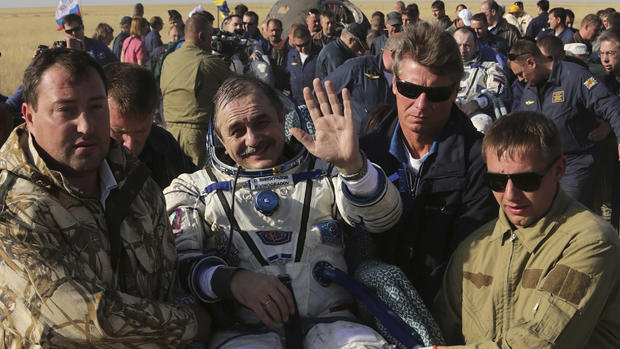Olympic torch prepped for launch to space station
Engineers are readying a Russian Soyuz spacecraft for launch late Wednesday to ferry three crew members to the International Space Station, along with an Olympic torch that will be featured in a weekend spacewalk photo op as a dramatic prelude to the 2014 Winter Games in Sochi, Russia.
With commander Mikhail Tyurin at the controls, flanked on the left by NASA flight engineer Rick Mastracchio and on the right by Japanese astronaut Koichi Wakata, the Soyuz TMA-11M spacecraft is scheduled to lift off from the Baikonur Cosmodrome in Kazakhstan at 11:14:15 p.m. EST (GMT-5; 10:14 a.m. Thursday local time).
If all goes well, Tyurin and Mastracchio will oversee an automated rendezvous and docking at the space station's Earth-facing Rassvet module around 5:30 a.m. Thursday.
In a departure from normal practice, the Soyuz launch schedule was juggled to get the Olympic torch to the space station and quickly back to Earth as part of a high-profile relay leading up to the opening ceremony of the Winter Games in February.
As a result, the Soyuz TMA-11M crew launching Wednesday will boost the lab's crew to nine instead of the usual six.
They will join Soyuz TMA-10M commander Oleg Kotov, Michael Hopkins and Sergey Ryazanskiy, launched Sept. 25, to make up the six-member Expedition 38 crew. Three other crew members -- Soyuz TMA-09M commander Fyodor Yurchikhin, flight engineer Luca Parmitano and Karen Nyberg -- will bring the Olympic torch back to Earth on Sunday. They were launched May 28 and are closing out a long-duration stay in space.
"We'll have three Soyuz vehicles and nine crew members," Mastracchio said in an interview from Star City near Moscow. "I think it's only happened one other time. It's going to be great to see Karen and Luca and Fyodor on orbit. I was there six months ago (in Kazakhstan) as their backup crew when they launched, so it's going to be great to see them on orbit, even for just a few days. It's going to be exciting."
All nine crew members plan to participate in a news conference Friday. The next day, Kotov and Ryazanskiy will take the Olympic torch outside at the start of an otherwise routine Russian maintenance spacewalk for a high-flying photo op to publicize the Winter Games.
"It's great to be a small part of the Olympics," Mastracchio said. "We'll hand off the Olympic torch to the Soyuz 10 crew, who will then take it out on a spacewalk. They'll then come back from the spacewalk, hand it to the Soyuz 9 crew and they will return it to Earth about five days after we arrive on the space station. So it's kind of like our own little relay with the torch on orbit."
The day after the spacewalk, Yurchikhin, Parmitano and Nyberg plan to board their Soyuz TMA-09M ferry craft and undock from the Zvezda command module's aft port at 6:26 p.m. Landing on the steppe of Kazakhstan is expected around 9:50 p.m. The torch then will be handed off to Olympic organizers for use in the opening ceremonies of the February games.
For Mastracchio, who logged 40 days in space during three space shuttle missions, launching aboard a Soyuz and having the opportunity to fly in the left seat, essentially the co-pilot's position, is a long-awaited opportunity.
"It's quite a different vehicle and that's really the main reason I'm looking forward to it so much," he said. "I was a flight engineer on the space shuttle, but I didn't have my own set of controls. Here in the Soyuz, I'm also the flight engineer but I'm actually going to be helping control the vehicle along with the commander.
"So I'm looking forward to having that front row seat, if you will, and actually helping operate the vehicle."
Learning how to operate a spacecraft is challenging under any circumstances. It was especially tough to do in a second language.
"It's very, very challenging," Mastracchio said. "Being an engineer, I have the skills to learn how to fly a vehicle and how to operate a vehicle, but the language skill was very challenging for me. It's not as easy as it sounds to fly a spacecraft while speaking a foreign language! Again, a big challenge, which made it very interesting to me."
